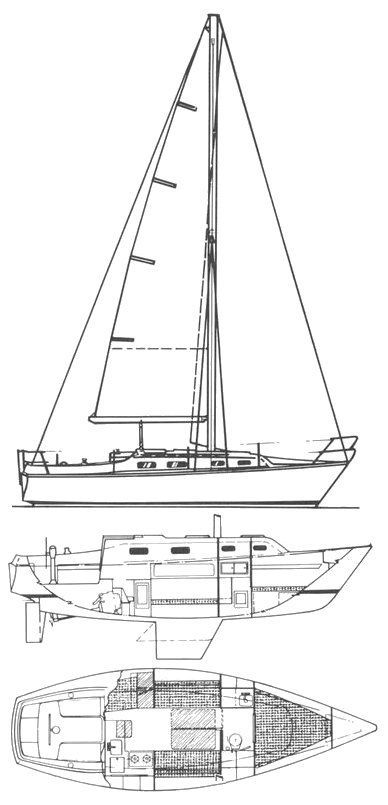The Hunter 27 is a classic cruising sailboat designed to offer an accessible and enjoyable sailing experience for families and enthusiasts. With an overall length of 27.17 feet and a waterline length of 22.0 feet, this monohull was conceived as a comfortable and forgiving vessel, prioritizing usable living space within its compact dimensions. Built by Hunter Marine, a company renowned for its efficiency in production and commitment to making sailing more attainable, the Hunter 27 embodies the builder's philosophy of balancing performance with comfort and ease of handling.
Hunter 27 Information, Review, Specs

- Make
- Hunter
- Model
- 27
- Number Built
- 2000
- Production Year(s)
- 1974 - 1984
The original Hunter 27 was produced by Hunter Marine from 1974 to 1984. This model was designed by John Cherubini, a notable naval architect. Hunter Marine, founded by Warren Luhrs, applied production line efficiencies learned from powerboat manufacturing to their sailboat lines, aiming to transform sailboat ownership and make sailing accessible. During the era of the Hunter 27's production, Hunter Marine gradually shifted its focus from purely racing boats to more comfortable cruising designs in the early 1980s, a philosophy reflected in the 27's generous interior volume.
The design of the Hunter 27 incorporated short ends to maximize sailing length and notably high freeboard to enhance interior volume. While the high freeboard and cabin trunk were necessary to achieve over six feet of headroom, these features were artfully disguised with feature stripes. Variations during its production run included a shoal draft or wing keel option, which altered the draft to 3.25 feet and increased displacement and ballast slightly. Later models also offered Yanmar diesel engines as an alternative to the original Renault power plant.
Sailing Performance and Handling
The Hunter 27 is characterized by predictable and forgiving sailing characteristics, making it well-suited for family cruising. Its sail area to displacement ratio (SA/D) of approximately 14.9 suggests it is a moderate performer, not necessarily designed for strong light-air performance but capable of moving well in typical cruising conditions. The boat's ballast to displacement ratio of approximately 0.43 indicates a stiff and stable vessel, capable of standing up to more wind and providing a comfortable motion, even when heeled. With a displacement-length ratio (DLR) of approximately 293, the Hunter 27 falls into the category of a moderately heavy, more traditional cruiser, emphasizing stability and comfort over outright speed. Owners generally describe the boat as a joy to sail, noting its stability and comfort even on a significant heel. The simple masthead sloop rig contributes to easy sail handling.
Accommodations and Layout
The interior of the Hunter 27 is designed to maximize comfort and prioritize usable living space within its compact size. With a maximum headroom of 6.08 feet, the boat offers ample vertical space for a vessel of its length. While specific details can vary by year, typical layouts generally feature a V-berth forward, a head, a salon area with settees and a table, and a galley. Some models were even equipped with a navigation table, an uncommon feature for a boat of this size. The T-shaped cockpit is considered one of the boat's better design features, offering reasonable comfort. Generally, the Hunter 27 aimed to provide a roomy interior, reflecting Hunter's emphasis on comfortable family cruisers.
Owner's Perspectives
Owners of the Hunter 27 frequently praise its stable and comfortable sailing characteristics, even in a mean heel. The boat is often seen as a significant upgrade in terms of space and comfort for those moving up from smaller vessels. However, some recurring issues are noted. A common complaint among owners concerns the original engine, an 8-horsepower Renault, which is sometimes perceived as undersized for the boat, although some owners report no problems with motoring [9,. Other specific issues that have been noted include potential red coolant fluid leaks below the engine. Owners also generally acknowledge that the Hunter 27 was built to a price point, which might imply certain compromises in original fittings or finish compared to higher-end vessels of the era. Despite these points, the enduring appeal and strong owner community attest to the overall reliability and enjoyment derived from Hunter-designed yachts.
Measurements
Construction & Hull
- Construction Material
- Fiberglass (Solid)
- Hull Type
- Monohull Sailboat
- Keel Type
- Fin
- Rudder
- 1x Skeg-Hung
- Ballast
- 3000 lbs
- Displacement
- 7000 lbs
- Water Capacity
- 35 gal
- Fuel Capacity
- 12 gal
Engine
- Engine Make
- Renault
- Engine Model
- —
- Engine Type
- —
- Engine HP
- 8
- Engine Count
- 1
- Drive Type
- —
- Fuel Type
- Diesel
Rig & Sails
- Rig Type
- Masthead Sloop
- P (Main Luff)
- 32.33 ft
- E (Main Foot)
- 9.92 ft
- I (Foretriangle Height)
- 37.67 ft
- J (Foretriangle Base)
- 11.25 ft
- Forestay Length (est)
- 39.31 ft
- Main Sail Area
- 160.36 sqft
- Foretriangle Sail Area
- 211.89 sqft
- Total Sail Area (Reported)
- 343 sqft
- Total Sail Area (Calc)
- 372.25 sqft
Dimensions
- LOA
- 27.17 ft
- LWL
- 22 ft
- Beam
- 9.25 ft
- Draft
- 4.25 ft
- Max Headroom
- 6.08 ft
- Air Draft
- 40.92 ft
Calculations
- Hull Speed
- 6.29 kn
- Pounds per Inch Immersion
- 727.13